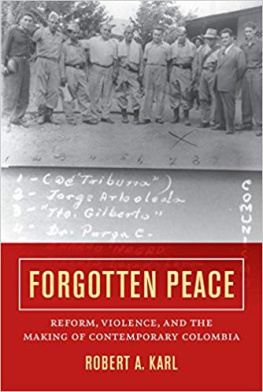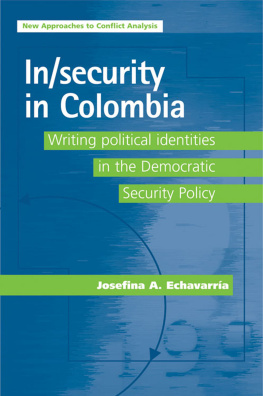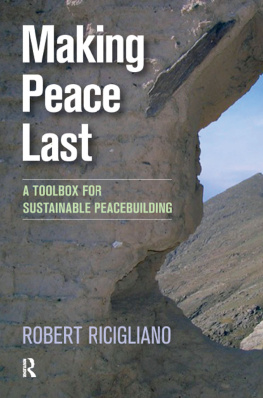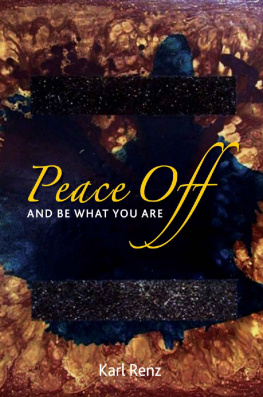Robert A. Karl - Forgotten Peace: Reform, Violence, and the Making of Contemporary Colombia
Here you can read online Robert A. Karl - Forgotten Peace: Reform, Violence, and the Making of Contemporary Colombia full text of the book (entire story) in english for free. Download pdf and epub, get meaning, cover and reviews about this ebook. year: 2017, publisher: University of California Press, genre: Politics. Description of the work, (preface) as well as reviews are available. Best literature library LitArk.com created for fans of good reading and offers a wide selection of genres:
Romance novel
Science fiction
Adventure
Detective
Science
History
Home and family
Prose
Art
Politics
Computer
Non-fiction
Religion
Business
Children
Humor
Choose a favorite category and find really read worthwhile books. Enjoy immersion in the world of imagination, feel the emotions of the characters or learn something new for yourself, make an fascinating discovery.
- Book:Forgotten Peace: Reform, Violence, and the Making of Contemporary Colombia
- Author:
- Publisher:University of California Press
- Genre:
- Year:2017
- Rating:5 / 5
- Favourites:Add to favourites
- Your mark:
- 100
- 1
- 2
- 3
- 4
- 5
Forgotten Peace: Reform, Violence, and the Making of Contemporary Colombia: summary, description and annotation
We offer to read an annotation, description, summary or preface (depends on what the author of the book "Forgotten Peace: Reform, Violence, and the Making of Contemporary Colombia" wrote himself). If you haven't found the necessary information about the book — write in the comments, we will try to find it.
Robert A. Karl: author's other books
Who wrote Forgotten Peace: Reform, Violence, and the Making of Contemporary Colombia? Find out the surname, the name of the author of the book and a list of all author's works by series.
Forgotten Peace: Reform, Violence, and the Making of Contemporary Colombia — read online for free the complete book (whole text) full work
Below is the text of the book, divided by pages. System saving the place of the last page read, allows you to conveniently read the book "Forgotten Peace: Reform, Violence, and the Making of Contemporary Colombia" online for free, without having to search again every time where you left off. Put a bookmark, and you can go to the page where you finished reading at any time.
Font size:
Interval:
Bookmark:
Edited by Pablo Piccato, Federico Finchelstein, and Paul Gillingham
Uruguay, 1968: Student Activism from Global Counterculture to Molotov Cocktails, by Vania Markarian
While the City Sleeps: A History of Pistoleros, Policemen, and the Crime Beat in Buenos Aires before Pern, by Lila Caimari
Forgotten Peace: Reform, Violence, and the Making of Contemporary Colombia, by Robert A. Karl
A History of Infamy: Crime, Truth, and Justice in Mexico, by Pablo Piccato
Death in the City: Suicide and the Social Imaginary in Modern Mexico, by Kathryn A. Sloan
Robert A. Karl

UNIVERSITY OF CALIFORNIA PRESS
University of California Press, one of the most distinguished university presses in the United States, enriches lives around the world by advancing scholarship in the humanities, social sciences, and natural sciences. Its activities are supported by the UC Press Foundation and by philanthropic contributions from individuals and institutions. For more information, visit www.ucpress.edu.
University of California Press
Oakland, California
2017 by Robert A. Karl
Library of Congress Cataloging-in-Publication Data
Names: Karl, Robert A., 1981 author.
Title: Forgotten peace : reform, violence, and the making of contemporary Colombia / Robert A. Karl.
Description: Oakland, California : University of California Press, 2017 | Includes bibliographical references and index.
Identifiers: LCCN 2016046167 (print) | LCCN 2016046544 (ebook) | ISBN 978-0-520-29392-2 (cloth : alk. paper) | ISBN 978-0-520-29393-9 (pbk. : alk. paper) | ISBN 978-0-520-96724-3 (ebook)
Subjects: LCSH : ViolenceColombiaHistory20th century. | Peace- buildingColombiaHistory20th century. | Social problemsColombia20th century. | InsurgencyColombia. | Colombia History19461974.
Classification: LCC HN 310. Z 9 V 54 2017 (print) | LCC HN 310. Z 9 (ebook) | DDC 303.609861dc23
LC record available at https://lccn.loc.gov/2016046167
Manufactured in the United States of America
25 24 23 22 21 20 19 18 17
10 9 8 7 6 5 4 3 2 1
To Beth, for the audacities, to be sure, but for the rest even more
This... tale of blood and martyrdom, of madness and cruelty, may never properly be history.
ALBERTO LLERAS CAMARGO, 1955
My first years of work on Latin America unfolded under the sign of two counterinsurgency wars. I departed the United States for my college study-abroad program on the night of September 10, 2001. I spent those next three anxious months in London, researching British counterinsurgency during the Malayan Emergency, while the United States occupied Afghanistan. Two years later, as I finished a thesis on U.S. counterinsurgency and development policy in 1960s Latin America, my graduate school recruiting visit coincided with protests against the pending U.S. invasion of Iraq. The resulting fascination with the projection of U.S. power eventually drew me to study Colombia. I arrived in Bogot to begin my research a few weeks before lvaro Uribes second inauguration, as the war against the FARC had already begun to turn. Early the next year, the U.S. troop surge in Iraq ramping up, I would write the first kernel of a dissertation on the origins of the FARC.
Yet if my intellectual interests had thus emerged hand-in-hand with events in the wider world, my attraction to the topic of (counter)insurgency eventually waned alongside counterinsurgencys fall from grace. By the start of 2012, counterinsurgency was on its way out as the favored doctrine of the U.S. military; in August, the Colombian government and the FARC had announced an agenda for peace negotiations. By then three years out from the dissertation, still searching for a path forward to the book, I arrived at the question of peace at the precise moment that Colombias attentions shifted away from counterinsurgency toward the possibility of peace. I likewise finished revising this book just weeks after Colombian voters rejected the October 2, 2016, referendum on peace with the FARC. Though I counted among those who fervently wished for a different outcome, this extraordinary coincidence of timing underscores the importance of thinking about the mutual constitution of ideas and practices of violence and peace.
I have, of course, accumulated no small number of debts over this past decade and a half. As a confirmed archive rat, my first thanks must go to the numerous archives and libraries where I conducted research for what became this book. Several institutions and people deserve extra praise. The Archivo General de la Nacin became my home-away-from-home in Bogot, thanks in large part to the generous support of Mauricio Tovar, and to my fellow researchers, including Adriana Rodrguez, my archival fairy godmother. Fabio Gonzlez Castro has been my man at the AGN, research assistant, Bogot fixer, andmost importantlygreat friend. Armando Moreno opened up his home in Ibagu, facilitated my research, and has tracked down a number of leads since. Gabriel Escalante Guzmn and Nelly Flrez Cabeza welcomed me to the Archivo Central e Histrico, Universidad Nacional, and the Archivo Histrico de Ibagu. Back in the States, Michael Evans made possible a short but productive visit to the National Security Archive. Some of the material from the JFK Library used in this book dates back to my days as an archival intern under Stephen Plotkin, who remains a backer of my work. Thanks also go to the staffs of the Biblioteca Daro Echanda in Ibagu, the Biblioteca Luis Angel Arango in Bogot, the Law School Library and Widener Library at Harvard University, and Firestone Library at Princeton University.
Research for this book was generously funded by Fulbright Colombia; the Lyndon Baines Johnson Library Foundation; the David Rockefeller Center for Latin American Studies and Weatherhead Center for International Affairs at Harvard; and the History Department, Program in Latin American Studies, and University Committee on Research in the Humanities and Social Sciences at Princeton. I was among the last in a long line of scholars of Colombia to experience Consuelo Valdiviesos expert support at the Fulbright Commission. At Princeton, Judy Hanson and Debbie Macy have helped things to move with as little administrative friction as possible. Princetons paid parental leave policy made it possible for to me complete this book while also caring for my daughters and supporting my wifes career.
My professors at Dartmouth College taught me how to be a historian and planted the seeds for this book. Marysa Navarro told me long ago that my undergraduate thesis topic could be a doctoral dissertation. I am so proud to get to share the book with her now. Agnes Lugo-Ortiz, the late Bob Russell, John Watanabe, and especially Emilio Kour further helped to stoke my interest in Latin America.
It is a testament to my graduate advisors that they did not blink when I switched countries in my third semester at Harvard. I owe an incalculable debt to John Womack Jr., who introduced me to Colombia and taught me to embrace a diversity of approaches and cultivate a deep appreciation for unnoticed detail. John Coatsworth got me thinking across big scales. Mary Roldns breadth of knowledge about Colombia, to say nothing of her scholarly and personal brilliance, continues to inspire. I am also fortunate to have learned from Jorge Domnguez, Carrie Elkins, and Akira Iriye.
Font size:
Interval:
Bookmark:
Similar books «Forgotten Peace: Reform, Violence, and the Making of Contemporary Colombia»
Look at similar books to Forgotten Peace: Reform, Violence, and the Making of Contemporary Colombia. We have selected literature similar in name and meaning in the hope of providing readers with more options to find new, interesting, not yet read works.
Discussion, reviews of the book Forgotten Peace: Reform, Violence, and the Making of Contemporary Colombia and just readers' own opinions. Leave your comments, write what you think about the work, its meaning or the main characters. Specify what exactly you liked and what you didn't like, and why you think so.






